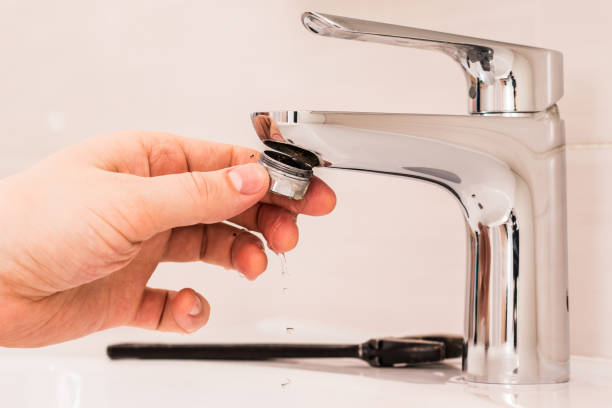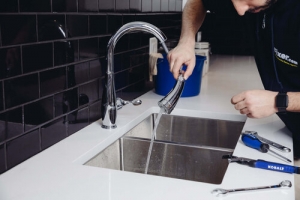Uncovering the Value of Correcting a Dripping Faucet
Uncovering the Value of Correcting a Dripping Faucet
Blog Article
This post in the next paragraphs on the subject of Why Are My Faucets Dripping (And Can I Fix It Myself)? is highly compelling. You should check it out.

Dripping taps could seem like a minor trouble, yet their influence goes beyond just the annoyance of the noise. From wasting water to incurring unneeded monetary expenses and health and wellness dangers, disregarding a leaking faucet can cause different repercussions. In this short article, we'll explore why it's important to address this common household concern without delay and properly.
Waste of Water
Environmental Effect
Leaking faucets add dramatically to water wastefulness. According to the Epa (EPA), a solitary tap leaking at one drip per second can lose more than 3,000 gallons of water per year. This not just stress water sources yet also impacts environments and wildlife depending on them.
Step-by-Step Guide to Dealing With a Dripping Faucet
Devices Needed
Prior to attempting to deal with a leaking tap, gather the needed tools, including a flexible wrench, screwdrivers, substitute components (such as washing machines or cartridges), and plumber's tape.
Common Faucet Issues and Their Solutions
Recognize the type of faucet and the particular problem triggering the drip. Usual troubles consist of damaged washing machines, rusty shutoff seats, or faulty O-rings. Refer to producer directions or on-line tutorials for detailed guidance on fixings.
Financial Prices
Enhanced Water Expenses
Beyond the environmental impact, dripping faucets can inflate water expenses considerably. The collected wastage gradually translates right into greater energy expenses, which could have been avoided with timely repair work.
Prospective Property Damages
Additionally, extended dripping can lead to harm to components and surface areas surrounding the tap. Water accumulation can create staining, deterioration, and even architectural problems if left unattended, leading to additional repair service prices.
Health and wellness Problems
Mold and Mold Development
The continuous visibility of dampness from a leaking tap develops an optimal environment for mold and mildew and mold development. These fungi not only endanger interior air top quality but also position health and wellness dangers, specifically for people with respiratory system conditions or allergies.
Waterborne Diseases
Stagnant water in dripping faucets can become a breeding ground for bacteria and other pathogens, increasing the threat of waterborne conditions. Impurities such as Legionella germs flourish in stagnant water, possibly bring about severe health problems when ingested or breathed in.
DIY vs. Professional Fixing
Benefits and drawbacks of Do It Yourself Repair Work
While some might attempt to fix a trickling faucet themselves, do it yourself repair work feature their own collection of difficulties. Without correct understanding and devices, DIY efforts can intensify the concern or lead to insufficient repairs, extending the trouble.
Benefits of Employing a Specialist Plumber
Hiring an expert plumber makes certain that the underlying reason for the leaking faucet is addressed properly. Plumbers have the knowledge and devices to diagnose and fix faucet problems effectively, saving time and lessening the threat of additional damage.
Ecological Responsibility
Private Payment to Preservation
Taking obligation for repairing dripping faucets straightens with more comprehensive efforts toward water preservation and ecological sustainability. Every individual's activities collectively make a significant influence on protecting precious sources.
Sustainable Living Practices
By focusing on prompt fixings and embracing water-saving habits, people add to sustainable living techniques that profit both present and future generations.
Safety nets
Normal Maintenance Tips
To avoid trickling faucets, do regular maintenance such as cleaning up aerators, evaluating for leaks, and replacing worn-out components without delay. Additionally, take into consideration installing water-saving devices or upgrading to a lot more effective components.
Relevance of Prompt Repairs
Dealing with dripping faucets as soon as they're discovered avoids further water wastage and potential damage, inevitably saving both water and money in the future.
Influence On Residential Or Commercial Property Value
Perception of Well-Maintained Residential Or Commercial Property
Maintaining a residential or commercial property in good condition, consisting of attending to upkeep problems like leaking faucets, enhances its perceived worth and worth amongst potential buyers or lessees.
Impact on Resale Value
Properties with properly maintained plumbing components, including taps, command higher resale worths in the realty market. Addressing trickling taps can contribute to a favorable impression throughout home examinations and settlements.
Verdict
Dealing with a trickling faucet exceeds plain benefit; it's a crucial step towards saving water, decreasing economic expenses, and securing health and building. Whether through DIY fixings or specialist aid, taking action to repair leaking taps is a tiny yet impactful means to advertise liable stewardship of sources and add to a much healthier, more lasting future.
Why Are My Faucets Dripping (And Can I Fix it Myself)?
Causes of a Dripping or Leaking Faucet
Whether you’re hearing drops of water falling and hitting a sink, or noticing water ooze out from the base of the spout, you shouldn’t ignore a dripping or leaking faucet. And, the good news is, sometimes you can fix the problem yourself.
In this article, we’ll review a few common causes of dripping and leaky. We’ll also walk you through some basic ways to find the problem and handle it without calling anyone — and let you know when to call in a pro.
But, no matter what the cause, or whether you can handle it on your own, the sooner you address it, the better.
Each drip may be a tiny amount of water. But, they all add up quickly. According to the U.S. Geological Survey, one faucet losing one drop every 20 seconds — five a minute — wastes around a liter of water every day, and 173 gallons a year.
Add in more than one in your house, and it’s a lot of water to waste. So, we’ll help you get to the bottom of things quickly.
Four Reasons Your Faucet May Be Dripping
Aerator is Damaged or Unseated Valve Seat is Corroded O Ring is Loose or Worn Out Part of the Assembly is Loose Aerator is Damaged or Unseated
If you unscrew the end of your faucet, you’ll find the aerator. It’s the little stem piece with a screen on it that shuts off the water circulation.
If it’s damaged, or if it’s not sitting right, it will allow water to pass through.
Valve Seat is Corroded
Next is the valve seat, which is connected to the washer. If the washer wasn’t in place correctly, then it could have ground against the seat. Over time, this damages the valve seat.
The problem could also be corrosion: Over time, the part has worn out, and it’s now allowing water to pass through.
O Ring is Loose or Worn Out
Since the o ring is only a small rubber gasket, it’s a common reason why the faucet is dripping. You’ll find it at the base of the faucet, and it’s there to keep water from coming out where it’s not supposed to.
However, it’s common for the o ring to wear out over time. When it does, you’ll notice a drip.
Part of the Assembly is Loose
So far, we’ve looked at a few small, specific parts. But, the problem could be anywhere in the assembly if something’s out of place.
Even if a part isn’t damaged, over time, it may have become loose or dislodged. It could be the parts we mentioned, or the aerator at the tip of the faucet, the stem itself,
Can I Fix a Leaky Faucet Myself?
Depending on the problem, and how handy you are, there’s a chance you can fix a leaky faucet without calling a professional. But, you do run the risk of making the problem worse.
If it’s a small drip, you can certainly try a few troubleshooting tactics. We’ll walk you through them in a moment.
But, no matter what, your first step should be shutting off the water coming into the faucet. You should find a shutoff valve under the sink on the pipes leading to it. Turn each one clockwise until they close tightly.
Next, make sure you have the right tools for whatever you’re attempting. It’s tempting to make do with what you have. But, you need the right ones for a reason: You’re often dealing with small parts that can break if you handle them carelessly.
If you’re feeling confident, here are some places to start.
Items Near the Tip of the Faucet
A few of the parts we mentioned — particularly the valve seat and washer — are located at the tip of the faucet where the water comes out. They’re easy to access, making it a good place to start.
Check the O Ring
To check the o ring, you’ll need to take off the spout at the base. It’s easiest on kitchen sinks with long spouts, versus the smaller, bulkier base on most bathroom sinks.
Either way, this can be tricky, so do it carefully and don’t force anything. If it’s not coming right off, you’re much better off calling in a pro than possibly breaking something.
For a kitchen sink, there’s usually a nut or coupling assembly at the base of the spout. These often slide off easily without using any tools.
Once you’ve disassembled those parts, gently but forcefully twist off the spout.
Then, you can see the o rings. There should be two of the rubber gaskets on the base. If they look worn or damaged, replace them, and see if that solves the problem.

As a reader on 4 Common Reasons for a Leaky Faucet, I think sharing that topic was sensible. Sharing is caring. Helping others is fun. We truly appreciate reading our article about .
Report this page